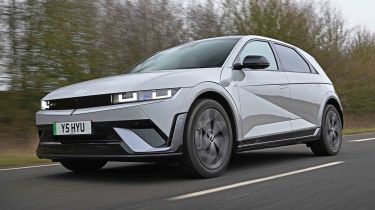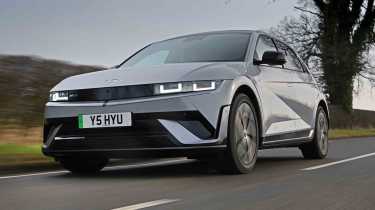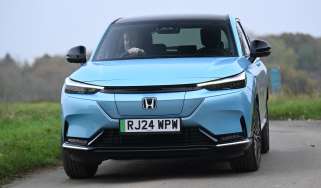Hyundai Ioniq 5 review
The refreshed Hyundai Ioniq 5 EV remains as competitive as ever, even against newer rivals

Our opinion on the Hyundai Ioniq 5
We made the Hyundai Ioniq 5 our Car of the Year in 2021, and four years down the line it’s still an appealing electric family car. A range of minor updates for the 2025 model year have boosted its refinement, tech and range, but none comes at the detriment of the overall package. While it looks like a sharply-styled hatchback, the Ioniq 5’s size means there’s excellent cabin space, while the design of the interior only helps to emphasise this. Add in a relaxing and smooth drive combined with decent performance, and it should be on any electric family car shortlist.
| Key specs | |
| Fuel type | Electric |
| Body style | Five-door, five-seat hatchback |
| Powertrain | 1x e-motor, 63kWh battery, rear-wheel drive 1x e-motor, 84kWh battery, rear wheel drive 1x e-motor, 84kWh battery, four wheel drive |
| Safety | Five-star Euro NCAP (2021) |
| Warranty | Five years/unlimited miles |
About the Hyundai Ioniq 5
It seems amazing to say it, but the Hyundai Ioniq 5 is one of the longest-serving models in the electric family car class, such is the rate of progress in the segment. It was the first of Hyundai’s new wave of Ioniq-badged models, and while it has the looks of a hatchback, the physical dimensions mean it sits closer to compact SUVs in size. It’s the sister car to the swoopy Ioniq 6 executive, but although both models use the same platform, they feature distinctly different styling cues.
While the Ioniq 5 won our Car of the Year prize in 2021, today it’s still hugely competitive against rivals, because it’s received a number of nips and tucks for 2025. Key among them for buyers who drive long distances will be the updated battery pack, which increases capacity from 77.4kWh to 84kWh. Along with tweaked aerodynamics, this has boosted the car’s range.
Used - available now

2022 Hyundai
Ioniq 5
26,173 milesAutomaticElectric
Cash £19,200
2022 Hyundai
Ioniq 5
23,209 milesAutomaticElectric
Cash £19,300
2022 Hyundai
Ioniq 5
31,591 milesAutomaticElectric
Cash £20,606
2022 Hyundai
Ioniq 5
41,821 milesAutomaticElectric
Cash £18,700There are also changes to the interior and safety tech, while various chassis upgrades are designed to elevate the Ioniq 5’s drive. A new shock absorber design aims to improve the ride, with a tougher cowl crossbar set to reduce steering vibration.
Reinforced sections around the rear axle look to boost stability and agility; they also reduce road noise, as has the addition of more sound insulation around the rear motor. The B-pillars have been toughened to improve protection in a side-on collision.
Prices for the Ioniq 5 start from just under £40,000, and the line-up comprises Advance, Premium, N Line, Ultimate and N Line S, while the Ioniq 5 N performance model is marketed as a separate machine, which you can read about here.
There’s the sole five-door, five-seat hatchback-style body offered – if you want something different, then the Ioniq 6 uses the same running gear in a slipperier shape. There are three powertrains to choose from, with Advance and Premium available with rear-wheel drive and either a 63kWh or 84kWh battery, while N Line cars and above are offered exclusively with the larger battery, but with a choice of rear or four-wheel drive.
Performance & driving experience
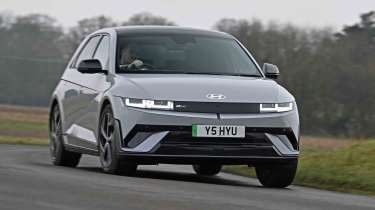
| Pros | Cons |
|
|
Buyers can choose from three motor options. The range starts with a single-motor model with 168bhp and 350Nm of torque, and this is only available with the smaller of the two battery options, at 63kWh.
The next step up increases the battery capacity to 84kWh and the power to 225bhp, while the range-topping model adds another motor at the front that raises the system output to 321bhp and 605Nm of torque.
Brake regeneration strength is controlled by paddles behind the steering wheel, with the power ranging from complete freewheeling to one-pedal driving. The paddle system is still the best and most intuitive system we’ve used for adjusting brake regen on the move.
Electric motors, 0-60mph acceleration and top speed
The 168bhp model can sprint from 0-62mph in 8.5 seconds, which will be fast enough for most people, while the 225bhp version with the bigger (and heavier) battery can cover the same sprint in 7.5 seconds. Four-wheel drive helps the 321bhp version to accelerate from 0-62mph in 5.3 seconds. All versions of the Ioniq 5 have a top speed limited to 114mph.
Town driving, visibility and parking
The chassis tweaks that Hyundai has introduced for 2025 aren’t transformative, but make one of the softest cars in the class a little more comfortable. The changes to the dampers are possible to spot from the moment you move off. Where the original Ioniq 5 was soft yet still allowed some jolts to enter the cabin over harsher road imperfections, the new set-up does a better job of rounding off the worst urban bumps. Light steering is useful around town, but the 12-metre turning circle is large, especially compared with a Skoda Enyaq’s 9.3 metres (10.8 metres for 4WD models).
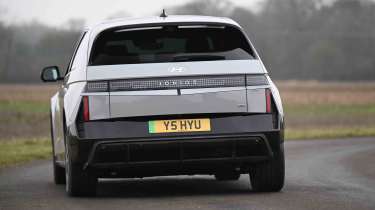
B-road driving and handling
Hyundai’s focus on comfort works at higher speeds, too. The car’s closest mechanical relative, the Kia EV6, doesn’t feel sharp enough through corners to justify its firm suspension set-up, yet the Ioniq 5 is unapologetically soft in comparison. While this means there’s not so much incentive to drive the car hard, the body control remains reasonable and there’s enough roll to communicate how much grip is available without things getting out of hand.
Single-motor versions of the Ioniq 5 gently push the chassis from the back axle, thanks to their real-wheel-drive layout, while four-wheel-drive models have strong traction, as you’d expect. Either way, the experience isn’t fun as such, but it’s well judged for what is primarily a sensible family car.
Motorway driving and long-distance comfort
At higher speeds, the Ioniq 5 is a little more refined than rivals from the Volkswagen Group, with less road noise – but a touch more wind noise – intruding into the cabin. Stability and comfort are excellent, too, and the steering is relaxed enough that the car doesn’t feel nervous.
Expert view, on driving experience
“Of all the detailed design tweaks that Hyundai has introduced for 2025, one of the simplest is also one of the most welcome. That’s because it has finally seen sense and fitted a rear window wash/wipe system to the Ioniq 5. While Hyundai isn’t the only firm guilty of not fitting one previously, it was silly to assume that the car’s aerodynamics would keep it clean. In reality, you had to travel at motorway speeds to prevent it from collecting spray and grime – a concern that is now a thing of the past.”
Alex Ingram, chief reviewer, tested the facelifted Ioniq 5 against the BYD Sealion 7
| Model | Power | 0-62mph | Top speed |
| Ioniq 5 Standard Range | 168bhp | 8.5 seconds | 114mph |
| Ioniq 5 Long Range | 225bhp | 7.5 seconds | 114mph |
| Ioniq 5 Long Range AWD | 321bhp | 5.3 seconds | 114mph |
Range, charging & running costs
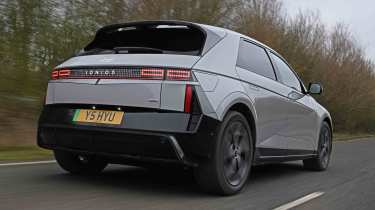
| Pros | Cons |
|
|
Efficiency figures are not outstanding for the class, although a standard-fit heat pump across the range should mean consistent efficiency when the weather turns cold. The Ioniq 5’s residual values aren’t particularly strong, but it’s still incredibly cheap to run as a company car.
Electric range, battery life and charge time
The increased battery capacities and superior aerodynamics bring a range of improvements for the latest Ioniq 5. Where the previous car could achieve, at best, a WLTP range of 315 miles, the revised model ups that to 354 miles. That figure is for single-motor models, but even the most potent twin-motor cars can almost match the best that the outgoing single-motor variant could achieve, hitting 307 miles on the WLTP cycle. The entry-level version with the smaller 63kWh battery can cover 273 miles – 35 miles up on the model it replaces.
As before, the Ioniq 5 doesn’t appear to be at the top of the class for efficiency, but we’ll reserve our full judgement until we’ve tried the car in warmer weather. On a cold day, we were on course to get 218 miles out of a single charge; we expect the summer months will return much better than the 2.6mi/kWh that took us to that distance, therefore bringing the range much closer to Hyundai’s claim.
Officially, the Ioniq 5 will charge at up to 233kW, making it possible to top up the battery from 10-80 per cent in 18 minutes. But due to the nature of its 800-volt system, you’ll need a 350kW charger to achieve that; without it, the speeds aren’t so impressive.
| Model | Battery size | Range | Insurance group |
| Ioniq 5 Standard Range | 63kWh | 273 miles | 33 |
| Ioniq 5 Long Range | 84kWh | 354 miles | 38 |
| Ioniq 5 Long Range AWD | 84kWh | 320 miles | 41 |
Insurance groups
With each car’s group depending on its power and trim level, the Ioniq 5 starts in group 33 insurance and climbs to group 41, while the hot Ioniq 5 N is in group 49 out of 50.
Tax
Every version of the Ioniq 5 sits in the lowest Benefit-in-Kind (BiK) tax band for company cars, which, as of April 2025, stands at three per cent. That makes the Hyundai as cheap to run as any other EV, and much less costly than a similarly priced plug-in hybrid, hybrid, petrol or diesel car.
Depreciation
Residual values aren’t great for the Ioniq 5 when compared with some rivals. The heaviest-depreciating model, the N Line S AWD, will maintain just 41.46 per cent of its original value after three years. The entry-level car is cheaper to buy and its 46.05 per cent depreciation figure is much closer to the class average. At the top of the range, the flagship Ioniq 5 N has established itself as a desirable performance EV, so it has strong residual values of 56 per cent.
Interior, design & technology
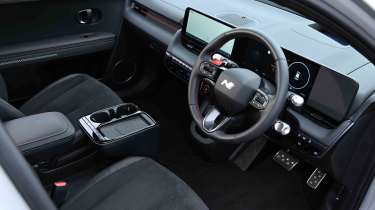
| Pros | Cons |
|
|
Concept car looks mean that the Ioniq 5 is a real head-turner that still stands out next to newer arrivals in the class. The retro-modern styling will appeal to those who appreciate a minimalist approach, although the LED headlight design adds some modern tech, with 256 individual ‘pixels’ used. This design has influenced other all-electric Hyundai Ioniq models, as well as the Hyundai Kona and Hyundai Santa Fe.
Inside, the driver is faced with a pair of 12.3-inch digital screens. One is a colour touchscreen covering the infotainment and sat-nav systems, while the other displays information for the driver. Minor interior updates for the 2025 model year don’t change the fact that there’s still much to like about the Ioniq 5’s cabin.
Interior and dashboard design
For 2025, the cabin maintains the same light, airy ambience that has always made the Ioniq 5 feel so spacious, but there are a few detail changes worthy of note. The raised portion of the centre console has been completely redesigned to accommodate more physical shortcut buttons. It also now houses the wireless smartphone charger to keep the user’s device in a more convenient spot.
The steering wheel gets a subtle update, with ‘pixel’ lights glowing at its centre – there’s still no Hyundai logo there – while the shortcut buttons above the climate controls have been subtly tweaked. Hyundai says this is to “enhance operational convenience”, but they were reasonable before and the change isn’t night and day now.
Materials and build quality
While the interior design looks fairly distinctive, the quality isn’t quite up with the class best. A Peugeot E-3008, Skoda Enyaq or even the cheaper Renault Scenic feel a little more special inside and slightly more sturdy in terms of switchgear and plastics.
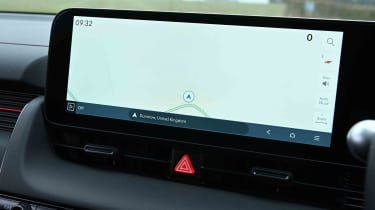
Infotainment, sat-nav and stereo
There are five trim levels to choose from, with even the base Advance spec featuring LED headlights, two 12.3-inch displays, adaptive cruise control with lane centring, a heated steering wheel and a heat pump to reduce the load of the cabin heater on cold days, as standard.
All but the base model get a 230-volt three-pin plug socket at the base of the back seats, too, enabling more power-heavy accessories to run off the car’s main battery. Digital side mirrors are available on top-spec trims, but we’d stick with the regular items for the sake of the tiny potential improvement in range the more aerodynamic cameras can offer.
The 12.3-inch touchscreen sits high up on the dash next to a driver’s display that is the same size, and its clear layout and no-nonsense graphics are fairly easy to use. But some menus are fiddly; the driver-assist page is opened via several button presses (plus a long press) on the steering wheel, and then the layout is a little fussy. Other brands, in particular Skoda and Renault, make switching the speed-limit warnings and lane-keep systems on and off much more intuitive.
Expert view, on design
“In addition to the technical upgrades applied to the Ioniq 5, Hyundai has also added a new trim level. N Line takes inspiration from the range’s halo model, the fabulous Ioniq 5 N, with a bodykit that adds extra menace. The extra black elements lend it a more athletic profile and emphasise the car’s width at the front, while 20-inch wheels finish off the look. A new steering wheel design and black interior scheme make the N Line’s cabin feel more sporty.”
Alex Ingram, chief reviewer, tested the facelifted Ioniq 5 against the BYD Sealion 7
Boot space & practicality
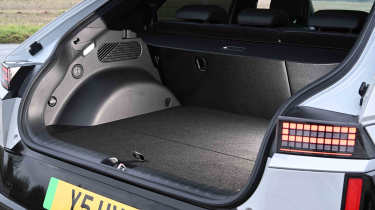
| Pros | Cons |
|
|
The Ioniq 5 is spacious for passengers and the boot volume is decent, but the shape of the cargo area isn’t as useful as some rivals. That’s down in part to the five-door hatchback exterior styling, where the steeply angled tailgate limits what can be stored there.
Dimensions and size
While the Ioniq 5 looks like a hatchback, if you’ve seen one in real life, you’ll know that it’s far larger than a Volkswagen Golf or suchlike. At 4.6 metres long, it matches a Toyota RAV4, while the three-metre wheelbase ensures there’s lots of space in the cabin.
| Dimensions | |
| Length | 4,655mm |
| Width | 1,890mm |
| Height | 1,605mm |
| Number of seats | Five |
| Boot space | 420-1,580 (plus 24 litres under the bonnet) litres |
Driving position, seats & space in the front
The open-plan cabin makes the front feel very spacious, and while the driving position is fairly car-like, you sit quite high relative to the window line, granting the driver decent all-round vision. Side-view cameras which engage when the indicators are activated improve visibility when turning into tight junctions or when changing lanes on a motorway – the camera feed appears in the driver’s display. Big door bins and the drawer-like glovebox offer useful storage options.
Seats & space in the back
Kneeroom in the back is excellent, with only the Tesla Model Y, Kia EV6 and BYD Sealion 7 offering more. Headroom is also decent, with a near-identical amount to the Hyundai Tucson SUV. But the seat base is a little low relative to the floor, so the seats don’t give as much under-thigh support as we’d like.

Boot space
At 520 litres, the Ioniq 5’s boot appears very large, but while the load bay floor covers a sizable area, it’s fairly shallow, so it can’t carry bulky loads as well as some rivals. The seat backs drop completely flat when folded – a process which, post-facelift, is done electrically in Ultimate and N Line S models. Either way, the volume grows to 1,580 litres, which is less than in rivals such as the Skoda Enyaq and BYD Sealion 7.
Expert view, on practicality
“There’s storage under the Ioniq 5’s bonnet, but it’s not very big. A total of 24 litres is barely enough for a charging cable, and is dwarfed by the likes of the Tesla Model Y (117 litres) and even the BYD Sealion 7 (58 litres).”
Alex Ingram, chief reviewer, tested the facelifted Ioniq 5 against the BYD Sealion 7
Reliability & safety
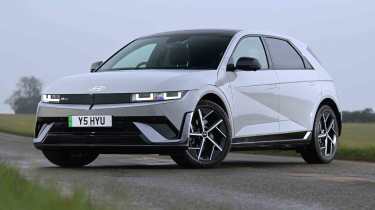
| Pros | Cons |
|
|
The Ioniq 5 has gained more safety tech for 2025, including hands-on detection for the steering wheel, improved lane-keep assist and remote smart parking assist functions, plus a collision-avoidance system that works from all angles, including when reverse parking.
The model was awarded five stars by Euro NCAP in 2021, and these new features, plus a car which is now structurally stronger around the B-pillars to improve side impact protection, should see it remain up-to-date with the latest safety standards.
Hyundai was ranked 17th out of 32 brands in our 2024 Driver Power customer satisfaction survey. That’s an odd result considering that fellow Hyundai Group firm Kia finished third with cars using largely the same mechanicals.
| Key standard safety features | Euro NCAP safety ratings |
|
|
Buying and owning
Best buy: Hyundai Ioniq 5 84kWh Premium RWD
If you don’t need the extended range of the 84kWh battery, then the 63kWh pack is fine, but you’ll need to charge it up more frequently. Premium trim has plenty of kit as standard, while Ultimate spec offers all the luxuries you can think of. We like these cars because the light cabin colours boost the cabin’s sense of space – the N Line variants are a little darker, so don’t feel quite as roomy (although there’s no difference to the space on offer), but some buyers will be tempted by the sportier looks that are offered by these models.
Hyundai offers a five-year, unlimited-mileage warranty for all of its passenger cars, along with 12 months of roadside assistance and free annual health checks of your vehicle for up to five years. The Ioniq 5’s lithium-ion battery is covered for eight years/125,000 miles, although it’s linked to a ‘minimum capacity’ caveat, which means any required repairs will return the battery to at least 70 per cent of its original capacity.
Hyundai offers service plans that are designed to meet your individual requirements, based on the car you own, expected mileage and the period you’d like the plan to cover. You can pay in a lump sum or interest-free monthly instalments.
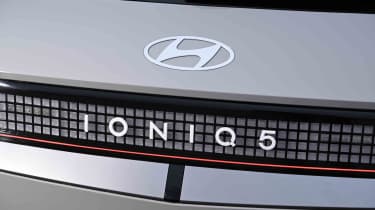
Alternatives
If you’re not a fan of the Ioniq 5’s looks, then there are other models that share the same running gear. Closest is the Ioniq 6, which features dramatic, swooping coupé-style bodywork, while sister firm Kia offers the EV6 and another stablemate, the Genesis GV60. The Ioniq 5 is the most comfortable of these models, with the EV6 offering a slightly sportier feel and the Genesis ramping up the luxury inside.
Rivals from other manufacturers include the Tesla Model Y, which has been updated, while the Renault Scenic is a strong contender in the class that offers good value. The Ford Explorer and Ford Capri share Volkswagen-sourced running gear and offer a decent drive, while VW’s own Volkswagen ID.4 and Volkswagen ID.5 are also worth considering. Elsewhere, the BYD Sealion 7 is a recent arrival that matches the Ioniq 5 on price and kit, but isn’t as good to drive.
Hyundai Ioniq 5 pictures
Frequently Asked Questions
It’s one of our favourite electric family cars. There’s lots of space inside, it’s comfortable and has a unique style. That’s why we named it our 2021 Car of the Year at our annual New Car Awards.
